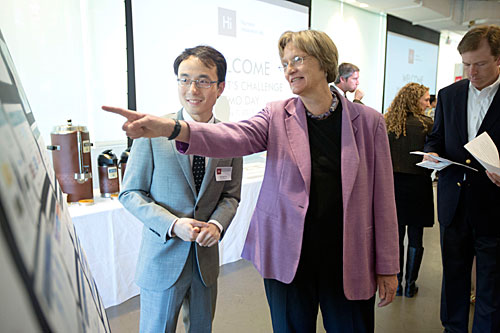Top problem solvers
Finalists in President’s Challenge share their ideas
This week at the Harvard Innovation Lab (i-lab) 10 teams of students from across Harvard demonstrated their projects as finalists in the President’s Challenge for social entrepreneurship. The winner and up to three runners-up selected later this month will take shares of the $100,000 purse and continue their residencies at the i-lab.
President Drew Faust said that she was struck by the values at the root of the finalist projects. “When we opened the i-lab and launched the President’s Challenge last year, we did so with the hope of attracting individuals with a shared passion for applying knowledge to improve the world,” she said. Faust added that many of the finalist teams connected students from Schools across the University, supporting the theme of “One Harvard.”
Patrick Ho, J.D. ’12, co-founder of Vaxess Technologies, which won the inaugural President’s Challenge in 2012, explained how winning the award transformed the Cambridge-based startup company. The most important asset in the face of entrepreneurial uncertainty wasn’t information or stability, but “confidence — overwhelming confidence in the face of the unknown,” he said.
“We certainly would not still be here if not for the support provided by President Faust and Harvard University — and given the ambition of your ideas, I can say without exaggeration that it is a benefit not only to the University, but also to the world, that you are now also about to set out on this path thanks to the President’s Challenge,” he said.
Finalist teams demonstrated innovative solutions to global problems — some of which have already been set in motion. Nucleik — led by Scott Crouch ’13, Florian Mayr ’13, and Matthew Polega ’13 — created information management software to help law enforcement agencies analyze gang activity. Police in Springfield have been using the tool since last August.
Crouch said that the outdated software systems used by police — “like something out of the ’70s and ’80s” — inspired the team to bring law enforcement analysis into the digital age. Nucleik restructures the way data is entered and used, giving officers faster access to complex information and relationships.
“The police love it,” Crouch said. “There have been instances when they’ve been able to learn new information about gang members from the analysis, and stop a shooting before it happens. It’s not predictive policing; it’s science.”
Crouch said that the support provided to each of the 10 finalist teams, including a $5,000 grant, dedicated space in the i-lab, and guidance from an expert mentor on how to develop the projects, was “phenomenal.”
“The workshops and the mentorship have helped us to hone our business model and our approach to entering these cities,” he said. “And the additional funds have allowed us to work with more departments outside Mass. and increase our presence nationally.”
Another team, Quantamerix, is inventing a low-cost diagnostic device to test newborn babies for easily treatable diseases. Stephanie Yaung, a Medical School student in the Harvard-MIT Health Sciences Technology program, said that being a finalist in the challenge has broadened the scope of the project immensely.
“The workshops we’ve done and the mentors who were assigned to us really helped us to think more deeply about the impact we could make and can make,” she said. “Not just how to implement it, but how to fit into the health care workflow of a country like China, for example, or how to get stakeholders on board — even other applications we hadn’t considered like home monitoring.”
Sightline Productions, which merges ethics, theater, genetics, and health, is a collaborative effort that transforms the real-life experience of a patient into a performance project, shedding light on the emotional and mental challenges of a diagnosis and condition.
“All of us have to face these questions at some point in our lives,” said Mariel Pettee ’14. “Seeing a performance of how someone has been affected by these problems on an emotional level connects [viewer] to it in a very visceral sort of way. It’s not a historical, stodgy thing — it’s accessible, and modern, and relevant.”
Pettee said that with help from the President’s Challenge seed money, the team has been in contact with Columbia Medical School, which has programming in narrative medicine — a field that helps doctors to interact and connect with patients on a personal level.
“The President’s Challenge really helped us with scope,” Pettee said. “Hopefully we’ll be able to bring this production to Columbia, and get scientists and artists together to have these conversations, create more of these professional pieces for the public, and develop socially relevant work.”
Gordon Jones, managing director of the i-lab, said: “We’re thrilled to host this challenge again. This year, we’ve introduced workshops and activities for all entrants to the challenge, not just the 10 finalist teams, to enable everyone to develop and get an idea of how to progress their ideas.“
The idea behind One Harvard, Jones said, is to create “a place where Schools pursue their excellence by coming together across disciplines, in collaboration and support of students and faculty — we’re proud to be part of that. The i-lab and the President’s Challenge, which we celebrate here today, are just two examples of One Harvard at work.”





